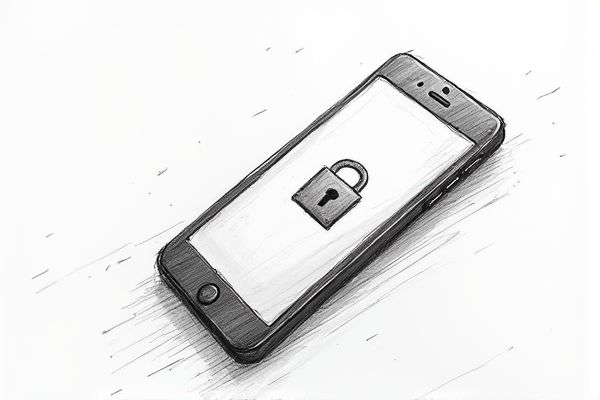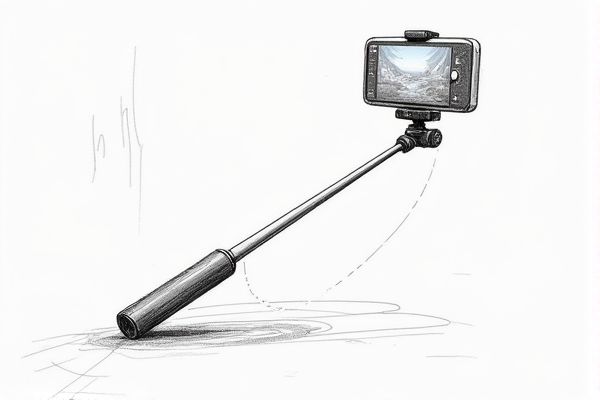In an age where our smartphones are a treasure trove of personal information, ensuring their security is more crucial than ever. Many brands prioritize this aspect, constantly updating and enhancing their security features to protect user data from potential threats. From robust encryption protocols to regular software updates, these brands set the standard for keeping digital information safe. To find out which smartphone brands are leading the way in mobile security, read below for a comprehensive list of top contenders.

Illustration of smartphone for security
Best brands of smartphone for security in 2025
Apple
Apple is renowned for its stringent security measures, making it one of the best producers of smartphones in terms of security. With a closed source code, Apple's iOS is less vulnerable to exploits compared to open-source systems like Android, reducing the frequency of hacks. In 2023, iPhone sales generated 51% of Apple's $390.8 billion revenue, highlighting the trust users place in Apple's security features. Apple's Passkeys and iCloud Keychain provide robust protection for user credentials, and features like Stolen Device Protection and Private Cloud Compute further enhance security and privacy. Additionally, Apple's strict app review process and updates like those in iOS 18 continue to elevate user security. Learn more about iPhone security.
Samsung
Samsung stands out as a leading producer of secure smartphones, thanks to its robust security features and commitment to updates. The company's Knox Security Platform provides a multi-layered defense against malware, phishing attacks, and other threats, with a secure hardware Root of Trust within the chipset protecting critical data like passwords and blockchain keys. Samsung ensures the integrity of its devices through boot time inspection, runtime protections, and continuous security monitoring, including 24/7 threat intelligence and a Bug Bounty Program that identified 1,434 vulnerabilities in 2020. Additionally, Samsung has pledged to provide regular security updates for at least four years for devices launched since 2019, covering series like the Galaxy Z, S, Note, A, XCover, and Tab. This comprehensive approach has helped Samsung maintain a significant share of the global smartphone market, with a 22% share in Q1 2023. For more insights on Samsung smartphone security, read the detailed analysis on What's new with Samsung smartphone security.
Google stands as a leading producer of smartphones with a strong focus on security, particularly through its Pixel series. With the introduction of Android 14, Google has enhanced security features to block 2G network exploits and baseband attacks, utilizing technologies like stack canaries and control-flow integrity (CFI) to protect against vulnerabilities. The Pixel phones are equipped with the Tensor G4 chip and the Titan M2 security chip, providing robust hardware-based security for sensitive data. These devices receive fast and regular security updates directly from Google, ensuring users have the latest protection available. Additionally, features like Google Play Protect and a built-in VPN further bolster the security of Pixel devices.
OnePlus
OnePlus is recognized as a strong contender in smartphone security, with its devices often scoring well in comprehensive security tests. For instance, the OnePlus 11 5G received high marks for various security features, including anti-malware protection, network security, and lost device protection, although it had some limitations in areas like identity protection and anti-phishing. Despite some concerns about data privacy, particularly with Chinese versions of their phones, global versions are generally considered safe and compliant with Western privacy laws. OnePlus phones also benefit from five years of security updates, a standard for premium devices, ensuring users receive timely security patches. This commitment to security, along with robust hardware and software features, makes OnePlus a reliable choice for those prioritizing smartphone security. For more insights, check out the best OnePlus phones.
Huawei
Huawei, despite facing various criticisms, has made significant strides in enhancing the security of its smartphones. The company has launched its own operating system, HarmonyOS, which includes features like secure boot, Trusted Execution Environment (TEE), and device certificate authentication to protect user data. Huawei has received four globally authoritative certifications on information security and privacy protection from the British Standards Institution (BSI). The company has also invested $2 billion in a Software Engineering Transformation to improve its software and cybersecurity measures and has established testing centers in several countries for independent security assessments. Additionally, Huawei has maintained a spotless cyber-security track record over its 30 years of operation, serving over three billion people across 170 countries. Learn more about their efforts and security measures on their official website.
Nokia
Nokia stands out as a leader in smartphone security, renowned for providing the fastest and most comprehensive software and security updates. According to a study by Counterpoint Research, Nokia has emerged as the most trustworthy brand in this regard for two consecutive years, ensuring 98% of its Android smartphones receive consistent updates, a stark contrast to other brands. Nokia phones are known for their clean software experience with minimal pre-installed apps, reducing vulnerabilities, and they offer biometric security features such as fingerprint sensors and facial recognition. The company promises 2 to 3 years of major software updates and three years of security updates for many of its latest models, enhancing user protection. This commitment to security helps Nokia phones retain their value over time.
Sony
Sony Xperia phones are recognized for their robust security features, including regular security updates, Android's built-in security such as data encryption and Google Play Protect, and unique extras like Side Sense and app permission controls. These features ensure that users' data is well-protected, with Sony working hard to release updates promptly, although sometimes these updates may be slower than those for other Android devices like Google Pixels. Additionally, Xperia phones offer secure lock screen options, Find My Device functionality, and the ability to control app permissions, enhancing overall security. For a comprehensive review on Xperia phones' security, visit How Secure are Xperia Phones
Xiaomi
Xiaomi, despite some historical concerns, has implemented significant security measures to protect user data. MIUI employs advanced security features such as file-based encryption, secure storage using AES-256, and a Trusted Execution Environment (TEE) to safeguard sensitive information. Xiaomi also uses Transport Layer Security (TLS) to encrypt data in transit and at rest, and offers regular security updates and built-in malware scans to enhance device security. While vulnerabilities have been identified, Xiaomi has addressed many of these issues through updates and patches, demonstrating a commitment to user security. For instance, since the 12.1.4 and 3.4.3 updates, data collection in incognito mode has been turned off by default in Mi and Mint browsers. For more detailed information about their security measures, visit Xiaomi's security website.
Blackberry
BlackBerry, once a dominant force in the smartphone market, is renowned for its robust security features, making it a top choice for secure smartphones. The brand's OS and Android-based devices are equipped with advanced security measures such as BlackBerry Integrity Detection (BID), downgrade prevention, and a secure compound environment to protect sensitive data. In its heyday, BlackBerry's secure messaging and email functionality made it a favorite among professionals, with a peak market share and 50 million units sold just a decade ago. Despite its market share dropping to 0.0% by the fourth quarter of 2016, BlackBerry continues to focus on software and security solutions, partnering with third-party manufacturers to keep the brand alive.
LG
LG is recognized as a significant player in the smartphone market, particularly for its efforts in enhancing device security. With over 20% of the Android OEM market share in the US, LG has addressed critical vulnerabilities, such as those in the LGATCMDService and WAP Push implementation, by issuing patches to protect users. The company has also improved security controls, notably with the Android 13 update, which includes features like notification permissions and camera/microphone usage alerts. Despite historical vulnerabilities, LG's proactive approach to security has made its devices more secure over time. For instance, the May 2018 security update fixed vulnerabilities in the default keyboard of LG smartphones, including models like the LG G4, G5, and G6. For more details on their smartphone offerings, visit the official LG mobile phones page.
















Leave a Reply
Your email address will not be published.